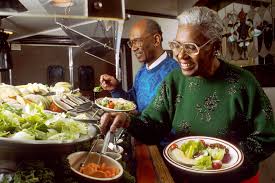Nutrition Tips for Seniors to Live Longer – and Healthier – Lives
 “You are what you eat.” That saying is just as true for seniors as it is for growing children, but seniors don’t always make the best choices when it comes to nutrition. For many older individuals, the work that goes into preparing healthy meals is sacrificed in favor of convenience, which often leads to less healthy choices. Thankfully, there are some things seniors and caregivers can do to ensure a nutritious diet without breaking the bank or cutting into quality time.
“You are what you eat.” That saying is just as true for seniors as it is for growing children, but seniors don’t always make the best choices when it comes to nutrition. For many older individuals, the work that goes into preparing healthy meals is sacrificed in favor of convenience, which often leads to less healthy choices. Thankfully, there are some things seniors and caregivers can do to ensure a nutritious diet without breaking the bank or cutting into quality time.
Better Snacks
Seniors have different appetites than younger individuals, which means that they often “graze” throughout the day instead of eating large meals. Unfortunately, the snack foods that older folks have easiest access to are not always the most healthy.
One solution is to switch out the chips and candy with nuts. Want motivation? A recent study concluded that people aged 55-90 who eat nuts regularly had a 39 percent lower risk of premature death.
Better Meals at Home
People who cook at home five times per week are almost 50 percent more likely to live throughout the next decade. Although cooking can be time consuming, caregivers can ease the process by helping with shopping, chopping and other preparations!
Consider Vegetarianism
It’s incredibly difficult to change one’s diet, especially for those who have lived decades eating familiar foods, but switching to a plant-based diet as a senior could be worth the effort. Vegetarians have a 12 percent lower risk of early death compared to their peers who continue to eat meat.
Switching to a new diet can also have benefits for the mind: it encourages trying new things, which can enhance neural pathways.
Increase Healthy Fats
“Fat” has developed an undeserved reputation as a dirty word in our society, but not all fats are bad. Foods such as olive oil that are rich in healthy fats can lead to a longer, healthier life. Some people refer to this type of diet as “Mediterranean,” but you don’t have to be European to benefit from it!
Increase Fiber Consumption
Heart disease and respiratory illnesses afflict the senior population in large numbers. Fortunately, seniors who eat the recommended daily amount of fiber – 38 grams for men; 25 grams for women – enjoy a much lower risk of death.
Avoid Processed Meats
 Sausage and bacon are staples in many peoples’ diets, but the pleasure derived from enjoying these processed meats may not be worth the risks involved: diets that are heavy in processed meats lead to a higher risk of dying from cancer or heart disease.
Sausage and bacon are staples in many peoples’ diets, but the pleasure derived from enjoying these processed meats may not be worth the risks involved: diets that are heavy in processed meats lead to a higher risk of dying from cancer or heart disease.
Move Ahead with Good Nutrition One Step at a Time
Nutrition is one of the most important factors when it comes to maintaining good health in the golden years. But changing one’s diet is never easy to do. That’s why we recommend making small, gradual changes. Start with “meatless Mondays” or by replacing unhealthy snacks with items like baby carrots or cashews. These small changes are easy to implement, and they can lead to more significant changes – and longer lives – down the road!
Are you interested in learning more about senior care? Give Always Best Care a call today at 1-855-470-CARE (2273) for more information, or visit us on the web at AlwaysBestCare.com!










